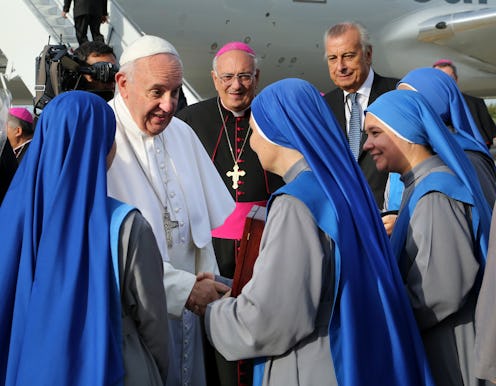News
Pope Francis Delivers A Confusing Message On Women
Pope Francis has made some grand statements since arriving in the United States, challenging local and world leaders on the issues of climate change, war and conflict, immigration reform, and poverty and capitalism. But what has largely been missing from Francis' dialogue is women — notably, how girls and women worldwide are disproportionately affected by poverty and do not have global equal rights on the basis of being female. To many Catholics, women do not have equal rights within their own religion. Yet while speaking at the World Meetings of the Families in Philadelphia on Saturday, Pope Francis called Catholic women the future of the church, praising their gifts and value to the church.
"We know that the future of the church, in a rapidly changing society, now calls for a much more active engagement on the part of the laity," Francis said. "In a particular way, it means valuing the immense contribution that women, lay and religious, have made and continue to make to the life of our communities."
This is perhaps the most important statement Francis has made on women since arriving in the United States. But that's not to say he hasn't thought about women during his trip. The pontiff gave New York nuns a big shout during a prayer service at St. Patrick's Cathedral Thursday evening. "Women of strength, fighters, with that spirit of courage which puts you on the front lines in the proclamation of the Gospel," the pontiff said. "I wish to say 'thank you,' a big thank you... and to tell you that I love you very much."
At the United Nations on Friday, Francis stressed the importance of education for girls, noting that millions of girls and young women around the globe still don't have the right to education — a right that he considers universal.
But what does Francis' latest statement on women mean? Like always, it's a conflicting message from the pontiff, who is often hailed as a progressive until women's rights are addressed. Two years ago, Francis called for a new "theology of women," but has never truly described how a new theology could redefine women's role in the Catholic Church.
In 2014, Francis also called for more women to serve as theologians. "The greater presence of women — although they are not many — is a call to reflect on the role women can and must have in the field of theology," Francis told the International Theological Commission, which advises the offices of the Vatican.
Yet the Vatican, even under Francis' papacy, has been resistant to giving women a seat at the table. Francis may want to recognize the contributions of women, yet he has publicly refused to appoint women to Vatican leadership positions. When asked why he doesn't want women serving in high ranks at the Vatican, Francis called the appointment of women "functionalism" and compared women's work to the work of the Virgin Mary.
For many Catholic women, therein lies the problem with Francis and male Catholic clergy: the emphasis on the "differences" between men and women ends up placing a woman's role as "mother" above all else. This line of thinking has influenced the hierarchy's position from women's ordination to reproductive rights, both of which are barred by the Catholic Church.
Francis may be calling for the appreciation of women, but chances are he overlooked those Catholic women who were at the papal parade in Washington, D.C. earlier this week to protest the church's male-only ordination policy. "He cannot preach about love and equality and poverty whilst telling women that they cannot discern their own vocations in life and that men need to decide what you can and cannot do and where you can and cannot speak," women's ordination advocate Miriam Duignan told The Guardian on Wednesday. "It sends out a terrible message throughout the world — he is legitimizing sexism."
